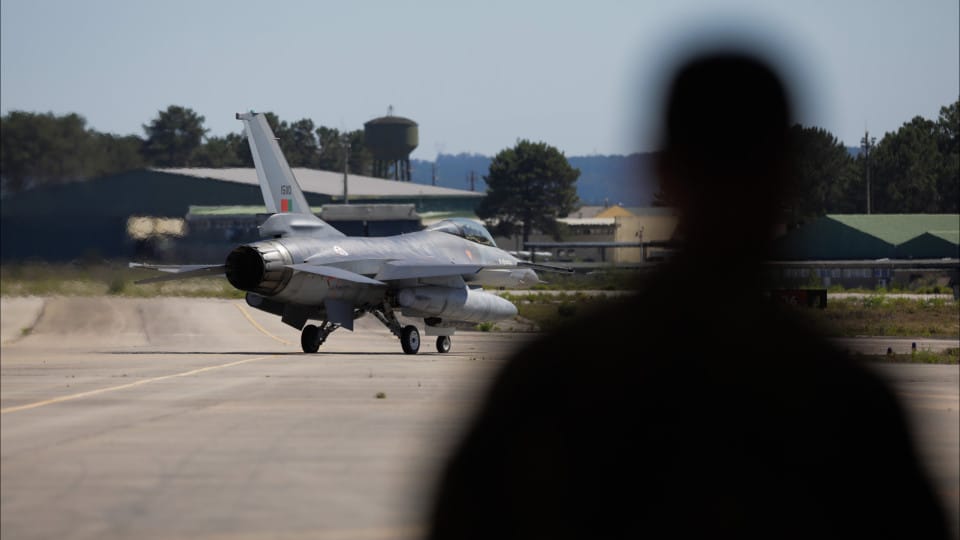The Chief of Staff of the Air Force, João Cartaxo Alves, warned today that Portugal is “falling behind” as F-16 fighters reach the end of their lives and other European countries adopt the F-35.
“We know that our F-16s are 30 years old, we know that their replacement, if there were any decision, would take ten years to arrive. That means that the F-16s would have to fly for more than 40 years,” according to the military chief, speaking to Lusa and TVI/CNN on the sidelines of a visit by Defense Minister Nuno Melo to Air Force and Marine Corps detachments on a NATO mission in Lithuania.
For Cartaxo Alves, the Air Force “has a great responsibility, which is to guarantee the sovereignty and integrity of the national airspace”, but in order to fulfill this mission, the country needs to decide what means it needs to operate.
“Aircraft are normally designed for 30 to 35 years, depending on the efforts they make over the course of their lives, which dictates their continued operation,” according to the general, noting that, in the case of the F-16, these fighters are characterized by their lethality, survivability and connectivity, the latter of which, he pointed out, is “extremely important in modern warfare”.
With these US fighters, “these factors are degrading” and they are subject to successive modernizations and upgrades, “while all the other countries are making the change” to the F-35.
“And we’re falling behind in this effort, which is increasingly a European effort,” warned Cartaxo Alves, not least because fewer and fewer countries have yet to make the change.
In this regard, the military chief said that the Air Force is working and gathering as much information as possible, “credible and secure”, so that the government can make an informed decision, “which will always depend on the country’s capabilities”.
In this process, counterpart forces that already have the F-35 are being consulted, as well as the manufacturer and the US Air Force, revealed Cartaxo Alves, for whom there is no alternative to this US aircraft.
“There is no other option,” he said, recalling that the Air Force had followed the development of the European fighter project very closely, which ended up falling victim to the situation of global instability and specifically after the Russian invasion of Ukraine in February 2022, precipitating the “increase in fifth generation capacity in Europe”.
From the moment that “Europe’s largest aircraft manufacturer, Germany, definitively opted for the acquisition of eighty F-35s, the future of the European fighter fell apart and there was no longer any other option,” according to the Chief of Staff of the Air Force.
In this regard, when confronted by journalists at the Siauliai base, where four F-16s and 87 Air Force soldiers are stationed, the Defense Minister promised “permanent dialogue” with the priority of investment in the Armed Forces, “based on the truth so as not to fail”, with the military leadership, who, with the exception of the Army, were listening to him at the time of these statements.
“What I’m saying is that it would be very abnormal if the people most responsible for the different branches didn’t demand the best of technology. That’s what we’re supposed to do, and political power is also supposed to be able to adapt budgetary possibilities to the wishes of the Armed Forces,” he commented.
This was Nuno Melo’s first official visit to Portuguese missions abroad, which also included a trip to Kairiai, Lithuania, where there is a detachment of 146 marines with the mission of deterring threats on NATO’s eastern flank through a continuous military presence.
Cartaxo Alves said that since 2017, this mission has been marked by “very strong cooperation ties” with Lithuania, making a “very positive” assessment in which “Portugal’s image is strengthened”.
Since the invasion of Ukraine, the proximity of Lithuania has given a new relevance to the F-16 detachment present in the country and its air policing missions in the Baltic Sea, particularly near the Russian enclave of Kaliningrad.
João Gonçalves, commander of the F-16 detachment, described the activity as normal, with interceptions of Russian aircraft every week, although he doesn’t see an increase, in line with the escalating tensions of the war in Ukraine.
The Russian aircraft intercepted are always military, according to the Air Force commander, sometimes they are fighter jets escorting other aircraft, other times they are transport planes.
“These factors end up bringing the war closer to us, but it doesn’t change our type of mission at all,” assured João Gonçalves, adding that whenever there is an exercise, whether by NATO or Russia, there ends up being an increase in activity in policing operations in the Baltic.
In most interceptions of Russian aircraft, the detachment’s commander described how the pilots reconnoiter the aircraft, identify it, photograph it and gather all the available information, for example, whether or not it is carrying weapons, and then simply escort it, with no contact ever having taken place between the cockpits of the planes.
“Obviously, if they’re escorting an aircraft that’s carrying something, they won’t want us to get that close, so on our side, what we do is maintain our professionalism,” he explained, and there is no record of any provocation that has caused problems for the safety of the planes in the air.








